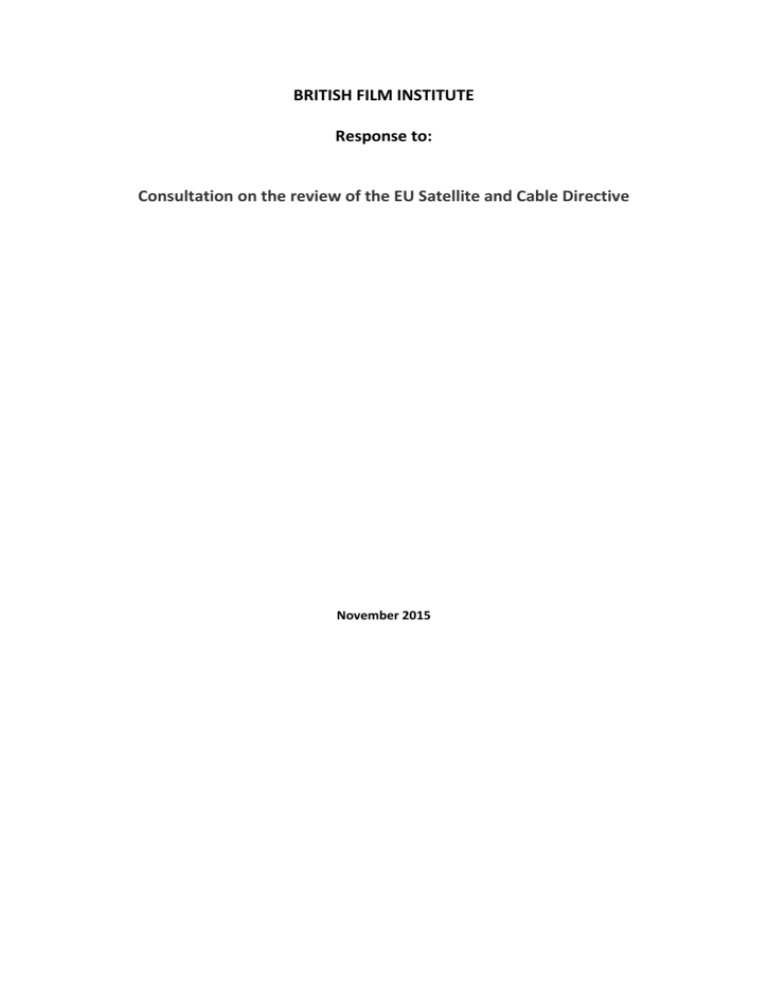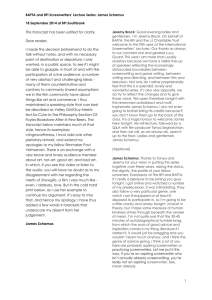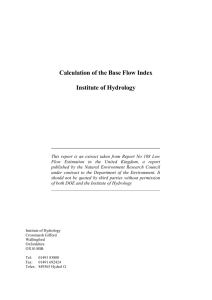Consultation on the review of the EU Satellite and Cable Directive
advertisement

BRITISH FILM INSTITUTE Response to: Consultation on the review of the EU Satellite and Cable Directive November 2015 Executive summary The British Film Institute (BFI) welcomes the opportunity to respond to the Consultation on the review of the EU Satellite and Cable Directive About the BFI In 2011 the BFI became the lead organisation for film in the UK. It is now a Government arm’s-length body and a distributor of Lottery funds for film. The BFI is a registered charity governed by Royal Charter. The Royal Charter notes that: The objects of the Institute shall be to encourage the development of the arts of film, television and the moving image throughout Our United Kingdom, to promote their use as a record of contemporary life and manners, to promote education about film, television and the moving image generally, and their impact on society, to promote access to and appreciation of the widest possible range of British and world cinema and to establish, care for and develop collections reflecting the moving image history and heritage of Our United Kingdom. Our mission is to ensure that film is central to our cultural life, in particular by supporting and nurturing the next generation of filmmakers and audiences. The BFI serves a public role which covers the cultural, creative and economic aspects of film in the UK. It delivers this role: As the UK-wide organisation for film, a charity core-funded by government; By providing Lottery and government funds for film across the UK; By working with partners to advance the position of film in the UK. In October 2012, the BFI published ‘Film Forever, Supporting UK Film 2012-2017’, which set out its strategy for the next five years, following an extensive industry consultation. It described the activities underpinning the BFI’s three strategic priorities: Expanding education and learning opportunities and boosting audience choice across the UK; Supporting the future success of British film; and Unlocking film heritage for everyone in the UK to enjoy. To that end, the BFI helps ensure that public policy supports film and, in particular, British film. Our organisation's registration number in the Transparency Register is: 38395686849-02 Response to questions in the consultation: The BFI is not qualified to comment on the majority of issues raised in the consultation, as many of these matters are of limited relevance to film. We share the Commission’s ambitions to improve the circulation of audiovisual works within Europe. The fulfilment of this goal would benefit both the UK industry – thereby enhancing competitiveness – and audiences. The BFI is actively involved in the broader debate around the Digital Single Market in an attempt to help ensure that any policy interventions are fit for purpose and benefit both right holders and audiences. In the context of the current consultation however, we are concerned about the lack of any meaningful evidence to date which would enable an informed analysis of the impact of some of the proposals contained within the Commission’s questions. Crucially, we believe that any extension of the country of origin principle in the Directive must not imperil the ability of right holders to licence their works on a territorial basis. Film and television producers depend on selling distribution rights to national distributors before filming starts as a means of financing. This is based on exclusive rights to exploit the piece of work in a specific territory. Territorial licensing is crucial to ensuring cultural diversity. Removing it would be likely to mean that only the biggest and strongest audiovisual companies would survive. Ends.











